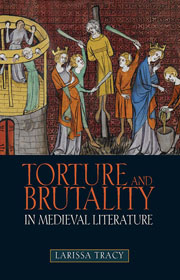Book contents
- Frontmatter
- Contents
- Acknowledgements
- Abbreviations
- Introduction
- 1 Rending the Flesh: The Orthodoxy of Torture in Hagiography
- 2 Resisting the Rod: Torture and the Anxieties of Continental Identity
- 3 The Matter of the North: Icelandic Sagas and Cultural Antonomy
- 4 The Matter of Britain: Defining English Identity in Opposition to Torture
- 5 Laughing at Pain: The Comic Uses of Torture and Brutality
- 6 Medieval Torture and Early-Modern Identity
- Conclusion
- Select Bibliography
- Index
4 - The Matter of Britain: Defining English Identity in Opposition to Torture
Published online by Cambridge University Press: 05 September 2013
- Frontmatter
- Contents
- Acknowledgements
- Abbreviations
- Introduction
- 1 Rending the Flesh: The Orthodoxy of Torture in Hagiography
- 2 Resisting the Rod: Torture and the Anxieties of Continental Identity
- 3 The Matter of the North: Icelandic Sagas and Cultural Antonomy
- 4 The Matter of Britain: Defining English Identity in Opposition to Torture
- 5 Laughing at Pain: The Comic Uses of Torture and Brutality
- 6 Medieval Torture and Early-Modern Identity
- Conclusion
- Select Bibliography
- Index
Summary
‘There is only one thing that arouses animals more than pleasure, and that is pain. Under torture you are as if under the dominion of those grasses that produce visions. […] Under torture you say not only what the inquisitor wants, but also what you imagine might please him, because a bond (this, truly, diabolical) is established between you and him.’
Brother William of Baskerville, The Name of the Rose, Umberto Eco (p. 63)As continental legal practice developed sophisticated mechanisms for extracting confessions or facilitating ‘discovery’, and as Scandinavian outposts like Iceland resisted that corrupting influence in sagas, often by allying themselves with the good rule of Anglo-Saxon kings, few medieval societies had such an uneasy relationship with torture as England. Balanced on the edge of the medieval world, England could resist the cultural and legal developments on the Continent. But by the thirteenth century, it was in danger of succumbing to political pressures as Angevin kings pressed their claims in France and the two cultures seemed destined to meld into one. Matthew Paris (c. 1200–1259) complained in his Chronica Majora that the presence of so many outsiders was causing problems in England. Coming over at the invitation of the king, they had taken over all the best positions, growing fat on the country's wealth and ‘trampling native born Englishmen under their heels’. The pope gave preference to non-English speakers, placing them in key offices in the English church, and outside influence was felt throughout the country.
- Type
- Chapter
- Information
- Torture and Brutality in Medieval LiteratureNegotiations of National Identity, pp. 132 - 190Publisher: Boydell & BrewerPrint publication year: 2012



